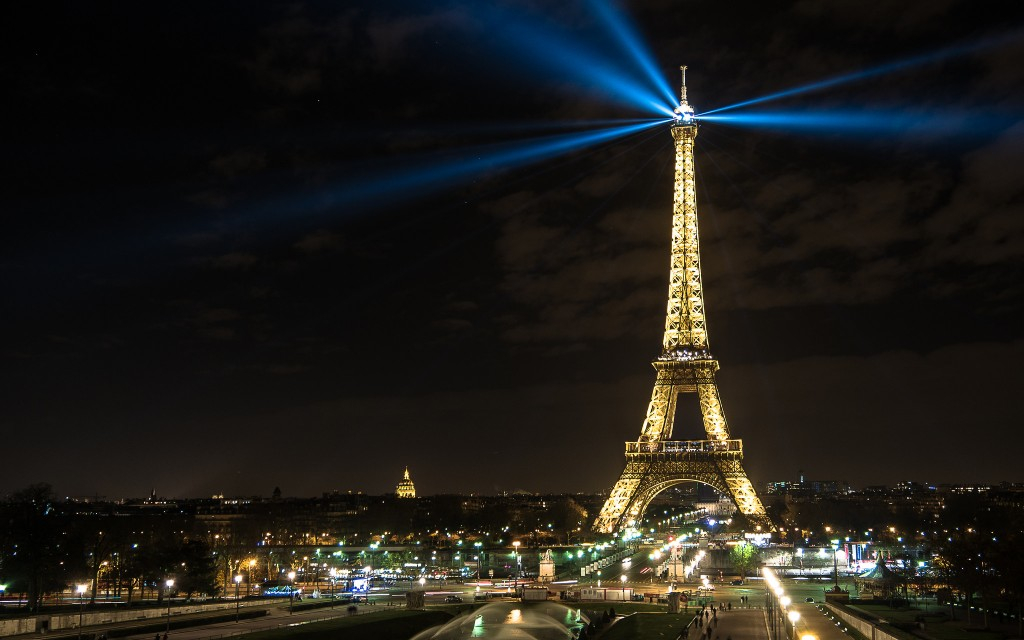Support strong Canadian climate journalism for 2025
United States Secretary of State John Kerry delivered a barnburner of a speech at the international climate conference in Paris yesterday. His remarks drew a standing ovation from the room, but also offered something more: a close read highlights three ways in which Paris is very different from previous climate summits, and how these differences might influence the final agreement.
1. The solution is in sight
The last major climate summit — Copenhagen in 2009 — may not seem that long ago, but there have been some dramatic changes in the intervening years. Most notably, clean energy has moved from a future prospect to an on-the-ground solution.
Kerry made a point of this when he spoke. Since Copenhagen, he noted, the price of solar power has dropped by 80 per cent and solar capacity has increased fivefold. That’s a dramatic shift.
He also emphasized how clean energy has become the safest, the most secure and now the cheapest way to power communities in emerging markets. And the evidence bears this out, as half of all power plants built in the world last year used renewable energy sources. IKEA CEO Peter Angefjäll, for example, noted that LED lights (light-emitting diodes) alone have improved efficiency by 10,000 times and delivered cost reductions of 90 per cent.
Pragmatic solutions like these are essential to implementing any successful climate deal.
2. All of the players are at the table
Plenty has already been written about how previously recalcitrant nations are taking an active role in these negotiations. “Canada is back,” we heard on the first day of the summit. China is now taking a leadership role — something that’s critical for a nation that both produces nearly one-third of global greenhouse gas emissions, but is also the global leader in solar and wind.
But it isn’t the various government delegations that are the real story in Paris — it’s the extent to which the private sector has turned out. Never before have there been so many businesses participating in and around an international UN climate summit. Never before have stranded assets been a hot topic in these conference halls. And never before have we had CEOs of multinationals on stage calling for an end to fossil fuel subsidies, a clear long-term emissions goal, and tools to price carbon pollution.
It’s not just the energy sector in attendance, either. Whether it’s the CEO of Unilever discussing how the next generation of consumers are sensitive to the green footprint of products, or the CEO of Ericsson explaining how communications technology can create emissions-cutting efficiencies, every industry is looking at how clean energy feeds into their business model. To paraphrase remarks by Francesco Starace, CEO and General Manager of Enel SpA: business needs to throw away all things that have to do with the old economy. They create encumbrances. The legacy of this old infrastructure is a burden; if it doesn’t fit, take it away.
It's clear a fundamental shift is happening in how global business leaders view the clean energy economy. And that in itself is hugely promising, as these leaders will be critical to operationalizing change on the ground once the COP21 climate agreement is announced.
3. We’re talking business
In the past, the rhetoric at international UN climate summits often emphasized the moral imperative to act on climate change. These Paris talks may be the first time that the business imperative of climate action also took centre stage.
That was evident from Secretary Kerry’s remarks. He of course spoke about the dangers of climate change, with the passion he has consistently brought to this issue. But he also kept shifting the focus back to the economic and development opportunities that come with climate action. “If we send the right signals, if we make the right choices, the private sector will deliver,” Kerry said. “Clean energy is not only the solution for climate change, it is also the greatest market opportunity the world has ever known.”
He’s not alone in seeing that opportunity. Paul Polman, Unilever CEO, told an audience in Paris that investments in clean energy and technology for his firm's plants have produced returns of 23 per cent. “Business isn’t stupid,” he said. “We are not putting money into a bottomless pit.”
The business community is waiting to see a Paris climate agreement that includes long-term signals, providing certainty precisely so these types of investments can not only succeed, but be accelerated. As the World Bank's climate change envoy and vice president, Rachel Kyte, said (borrowing a phrase from Hans Joachim Schellnhuber, director of the Potsdam Institute for Climate Impact Research), what's being engineered at the Paris summit is "the induced implosion of the carbon economy."
A strong agreement will need to clearly reinforce that notion. Otherwise, the current pace of the energy transition may not deliver a world below 2 C, let alone 1.5 C.
In the hours and days ahead, we should get a clear sense of what the agreement coming out of Paris will look like. But what’s already clear is that this climate summit is like none that have come before it.
Written by Clean Energy Canada's Merran Smith and Zoë Caron, from the UN Climate Summit in Paris.



Comments